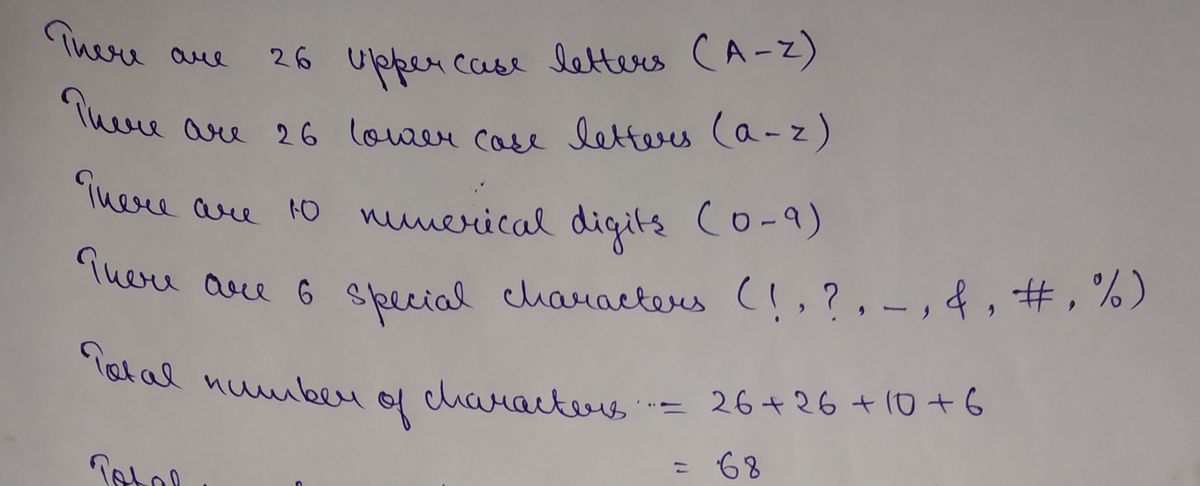5. Suppose you invent a new programming language. You allow variables to be created that are of at least three characters, but no more than five characters in length. The characters can be capital or lowercase letters, numerical digits, or one of the special characters in the set {!, ?, , &, #, %}. The first character in a variable cannot be a special character. a.) How many variables, in total, can be created in this programming language? (If you prefer, you can leave your answer as an expression rather than as a single number. For 3 ( 54 ) 3 would be acceptable in place of the evaluation of this example expression, which would be 472,392.) b.) Recompute your answer, but now assume that characters cannot be repeated. Assume, still, that the first character cannot be one of the special characters.
5. Suppose you invent a new programming language. You allow variables to be created that are of at least three characters, but no more than five characters in length. The characters can be capital or lowercase letters, numerical digits, or one of the special characters in the set {!, ?, , &, #, %}. The first character in a variable cannot be a special character. a.) How many variables, in total, can be created in this programming language? (If you prefer, you can leave your answer as an expression rather than as a single number. For 3 ( 54 ) 3 would be acceptable in place of the evaluation of this example expression, which would be 472,392.) b.) Recompute your answer, but now assume that characters cannot be repeated. Assume, still, that the first character cannot be one of the special characters.
Algebra and Trigonometry (6th Edition)
6th Edition
ISBN:9780134463216
Author:Robert F. Blitzer
Publisher:Robert F. Blitzer
ChapterP: Prerequisites: Fundamental Concepts Of Algebra
Section: Chapter Questions
Problem 1MCCP: In Exercises 1-25, simplify the given expression or perform the indicated operation (and simplify,...
Related questions
Question

Transcribed Image Text:5. Suppose you invent a new programming language. You allow variables to be created
that are of at least three characters, but no more than five characters in length. The
characters can be capital or lowercase letters, numerical digits, or one of the special
characters in the set {!, ?, , &, #, %}. The first character in a variable cannot be a
special character.
a.) How many variables, in total, can be created in this programming language? (If you
prefer, you can leave your answer as an expression rather than as a single number. For
3 ( 54 ) 3 would be acceptable in place of the evaluation of this
example
expression, which would be 472,392.)
b.) Recompute your answer, but now assume that characters cannot be repeated.
Assume, still, that the first character cannot be one of the special characters.
Expert Solution
Step 1

Trending now
This is a popular solution!
Step by step
Solved in 3 steps with 3 images

Knowledge Booster
Learn more about
Need a deep-dive on the concept behind this application? Look no further. Learn more about this topic, algebra and related others by exploring similar questions and additional content below.Recommended textbooks for you

Algebra and Trigonometry (6th Edition)
Algebra
ISBN:
9780134463216
Author:
Robert F. Blitzer
Publisher:
PEARSON

Contemporary Abstract Algebra
Algebra
ISBN:
9781305657960
Author:
Joseph Gallian
Publisher:
Cengage Learning

Linear Algebra: A Modern Introduction
Algebra
ISBN:
9781285463247
Author:
David Poole
Publisher:
Cengage Learning

Algebra and Trigonometry (6th Edition)
Algebra
ISBN:
9780134463216
Author:
Robert F. Blitzer
Publisher:
PEARSON

Contemporary Abstract Algebra
Algebra
ISBN:
9781305657960
Author:
Joseph Gallian
Publisher:
Cengage Learning

Linear Algebra: A Modern Introduction
Algebra
ISBN:
9781285463247
Author:
David Poole
Publisher:
Cengage Learning

Algebra And Trigonometry (11th Edition)
Algebra
ISBN:
9780135163078
Author:
Michael Sullivan
Publisher:
PEARSON

Introduction to Linear Algebra, Fifth Edition
Algebra
ISBN:
9780980232776
Author:
Gilbert Strang
Publisher:
Wellesley-Cambridge Press

College Algebra (Collegiate Math)
Algebra
ISBN:
9780077836344
Author:
Julie Miller, Donna Gerken
Publisher:
McGraw-Hill Education